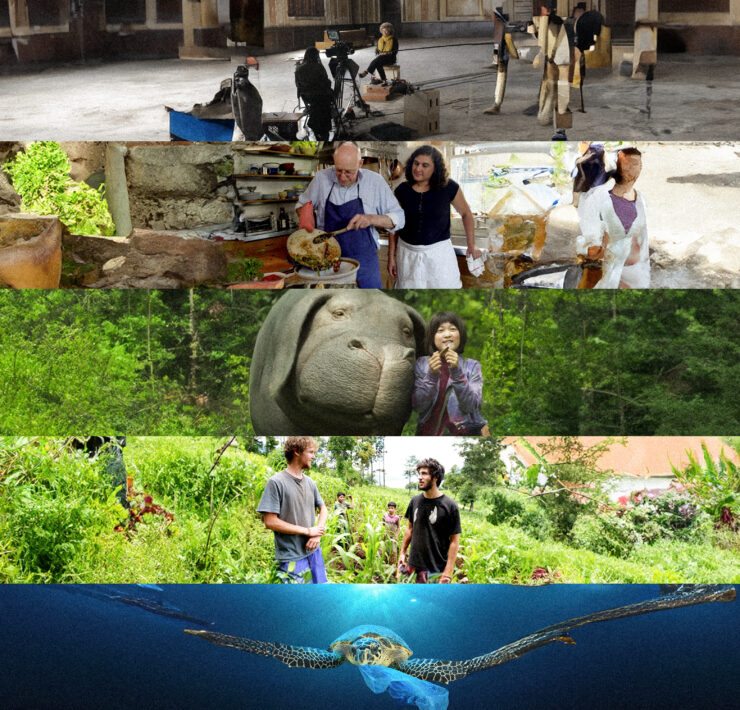
As the director and co-writer of the Dark Knight trilogy of Batman films, as well as the prime creative power behind a slew of other modern classics, including Memento, The Prestige and the mega-blockbuster Inception, Christopher Nolan has been responsible for more than $3.5 billion in worldwide box office sales while earning top-notch reviews for his highly inventive and mind-bending projects.
And this year, he catapults even further into a position of Hollywood power, producing and consulting on Zack Snyder’s star-studded Man of Steel, the latest film adaptation of history’s most iconic superhero.
But Nolan wasn’t always lauded as the master of the modern blockbuster. His first feature film, Following, went unnoticed upon its initial release in 1998. It centers on a lonely London man who spends his days choosing random people to follow around the city for hours at a time. While it starts out as a creepy character study, Following quickly grows into something more thrilling: a twisty, Hitchcock-worthy suspense tale as the man eventually chooses the wrong person to shadow and finds his world coming apart at the seams.
The film tanked. It didn’t even break $50,000 in its tiny theatrical run. However, after Nolan’s explosion in popularity, Following has retroactively taken on surprising new life as a cult classic.
Here, one of this era’s most celebrated and trusted filmmakers sheds light on his early strides, his creative process and how even a young British storyteller playing with toys and a simple camera can go on to achieve worldwide acclaim.
Q: Tell us about Following. It’s gotten popular lately. What was the inspiration for the film?
A: It primarily came from living in Central London. I got interested in the idea that as you walk through the crowded streets—just masses of people—and you start picking one person to focus on and wonder about them, it shifts your perspective. Who are they, and where are they coming from?
I combined [that with] the notion of somebody breaking down those protocols, such as when you’re walking down a crowded street, you don’t keep pace with a stranger. Suddenly, this man [in the film] is keeping pace.
Around the same time, I got interested in the idea of seeing a door that was smashed open and was flimsy but was keeping people out. Why? Because of those protocols—like a door is a door and you can’t just go through it without permission. So breaking down those protocols was the key to everything.
Q: Do you remember the first project you ever worked on?
A: If it gives you any clue, my first kid film was Space Wars. I would take the blockbusters of the day, the Bond films of the time, and turn them around somewhat. Eventually, I did more experimental films, like [1970s eccentric filmmaker] Nicolas Roeg’s.
Q: You started out with no money. How did you make your first feature-length movie?
A: I worked out that I could afford to buy 15 minutes of raw film stock a week, and we shot one day a week. I thought it would take three months [to finish], but it wound up taking a year.
We were all working jobs during the week but would get together once a week to shoot and get five minutes or eight minutes done. The whole film was done in first and
second takes.
Given what I now know about how much takes can improve performances, we stumbled into it being so good. We rehearsed up to six months ahead, as if we were performing on stage, where you can’t fumble and just stop but have to work through mistakes.
Q: As a director, how did you learn how to work with different actors?
A: I read Stanislavsky’s Method acting books to understand the process. I dabbled a tiny bit in acting. I knew people from the drama society in college and got them to fill all the roles in Following. I just try to tell people where to cross on screen, and let them do their thing. Stay out of the way and let them find a way to be real.
Q: Your first few films, Following and Memento, aren’t linear at all, but even your most straightforward movies can’t be called “chronological.” Why do you approach storytelling that way?
A: Graham Swift’s book Waterland effortlessly bounces through history to tell a synthesized story. So do the films of Nicolas Roeg or Alan Parker’s Pink Floyd—The Wall, with parallel strands of imagination and history.
When I look at how we receive stories in real life, they’re almost never chronological. You read a newspaper headline and get the vague idea, but as you read the article, it’s filling the information in from all the directions.
Two days later, you learn more through another article on the subject. We very rarely get the full story on anything in chronological fashion.
Q: Did you write Inception all the way through or in parts?
A: I’ve done all my scripts since Following in linear fashion. I tried to think how it would feel as an audience watching it so you get the rhythm of the film.
A big problem is that people don’t like to read a lot of stage directions, and the form of the screenplay invites you to focus on the dialogue. With my scripts, you don’t really get a sense of what the structure is going to be.
Interestingly, all the films that I’ve done, they’ve followed the same pattern as Following. You have to show the reader how the story is going to work.
Q: Your films get a lot of Hitchcock comparisons. Do you consider him an influence?
A: I became a big Hitchcock fan later in life. They’re more grown up films.
I did remember seeing the shower scene from Psycho in a TV special and being afraid to shower for years. Strangers on a Train was a big favorite of my life.
Q: You mentioned remaking James Bond films as a kid. Would you do a James Bond film at this point?
A: I’d love to at some point. But the truth is, I’ve been busy ripping them off.
Everybody around the world loves James Bond, but not like the English. You watch his movies with the family after opening presents on Christmas Day.
Q: What films do you have left to make?
A: The favorite script of mine I’ve written is about Howard Hughes, but I never had time to make it.
I always wanted to do a science fiction film, and so far I guess Inception is halfway there. It would be fun to explore at some point.
Q: Lastly, tell us about working with Michael Caine.
A: Personally, I think his contribution to acting is “never blink.”
He made very specific rules in a book and video several years back. He comes completely prepared and knows just what he wants to do—never asks for another take and swears he never has.
He’ll try things a different way for you, but he’s very focused and will never waste your time and money while filming.





















